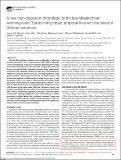Files in this item
A new high-resolution chronology for the late Maastrichtian warming event : establishing robust temporal links with the onset of Deccan volcanism
Item metadata
| dc.contributor.author | Barnet, James S. K. | |
| dc.contributor.author | Littler, Kate | |
| dc.contributor.author | Kroon, Dick | |
| dc.contributor.author | Leng, Melanie J. | |
| dc.contributor.author | Westerhold, Thomas | |
| dc.contributor.author | Röhl, Ursula | |
| dc.contributor.author | Zachos, James C. | |
| dc.date.accessioned | 2020-10-27T16:56:50Z | |
| dc.date.available | 2020-10-27T16:56:50Z | |
| dc.date.issued | 2018-02-01 | |
| dc.identifier | 270865756 | |
| dc.identifier | 2834ca4a-bf58-4a18-a4d1-dad3cefc489c | |
| dc.identifier | 85043307772 | |
| dc.identifier.citation | Barnet , J S K , Littler , K , Kroon , D , Leng , M J , Westerhold , T , Röhl , U & Zachos , J C 2018 , ' A new high-resolution chronology for the late Maastrichtian warming event : establishing robust temporal links with the onset of Deccan volcanism ' , Geology , vol. 46 , no. 2 , pp. 147-150 . https://doi.org/10.1130/G39771.1 | en |
| dc.identifier.issn | 0091-7613 | |
| dc.identifier.other | ORCID: /0000-0003-3885-5664/work/82501085 | |
| dc.identifier.uri | https://hdl.handle.net/10023/20830 | |
| dc.description | The new Ocean Drilling Program Site 1262 δ13C and δ18O data were funded by the Natural Environment Research Council Isotope Geosciences Facility at the British Geological Survey (IP-1581–1115). Financial support for this research was provided by the Deutsche Forschungsgemeinschaft (DFG) to Ursula Röhl and Thomas Westerhold. | en |
| dc.description.abstract | The late Maastrichtian warming event was defined by a global temperature increase of ~2.5–5 °C that occurred ~150–300 k.y. before the Cretaceous-Paleogene (K-Pg) mass extinction. This transient warming event has traditionally been associated with a major pulse of Deccan Traps (west-central India) volcanism; however, large uncertainties associated with radiogenic dating methods have long hampered a definitive correlation. Here we present a new high-resolution, single species, benthic stable isotope record from the South Atlantic, calibrated to an updated orbitally tuned age model, to provide a revised chronology of the event, which we then correlate to the latest radiogenic dates of the main Deccan Traps eruption phases. Our data reveal that the initiation of deep-sea warming coincides, within uncertainty, with the onset of the main phase of Deccan volcanism, strongly suggesting a causal link. The onset of deep-sea warming is synchronous with a 405 k.y. eccentricity minimum, excluding a control by orbital forcing alone, although amplified carbon cycle sensitivity to orbital precession is evident during the greenhouse warming. A more precise unnderstanding of Deccan-induced climate change paves the way for future work focusing on the fundamental role of these precursor climate shifts in the K-Pg mass extinction. | |
| dc.format.extent | 4 | |
| dc.format.extent | 272491 | |
| dc.language.iso | eng | |
| dc.relation.ispartof | Geology | en |
| dc.subject | QE Geology | en |
| dc.subject | NDAS | en |
| dc.subject | SDG 13 - Climate Action | en |
| dc.subject.lcc | QE | en |
| dc.title | A new high-resolution chronology for the late Maastrichtian warming event : establishing robust temporal links with the onset of Deccan volcanism | en |
| dc.type | Journal article | en |
| dc.contributor.institution | University of St Andrews. School of Earth & Environmental Sciences | en |
| dc.identifier.doi | https://doi.org/10.1130/G39771.1 | |
| dc.description.status | Peer reviewed | en |
This item appears in the following Collection(s)
Items in the St Andrews Research Repository are protected by copyright, with all rights reserved, unless otherwise indicated.

